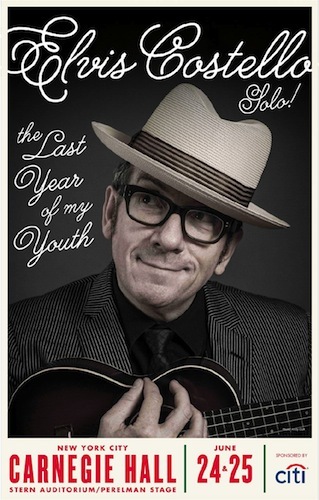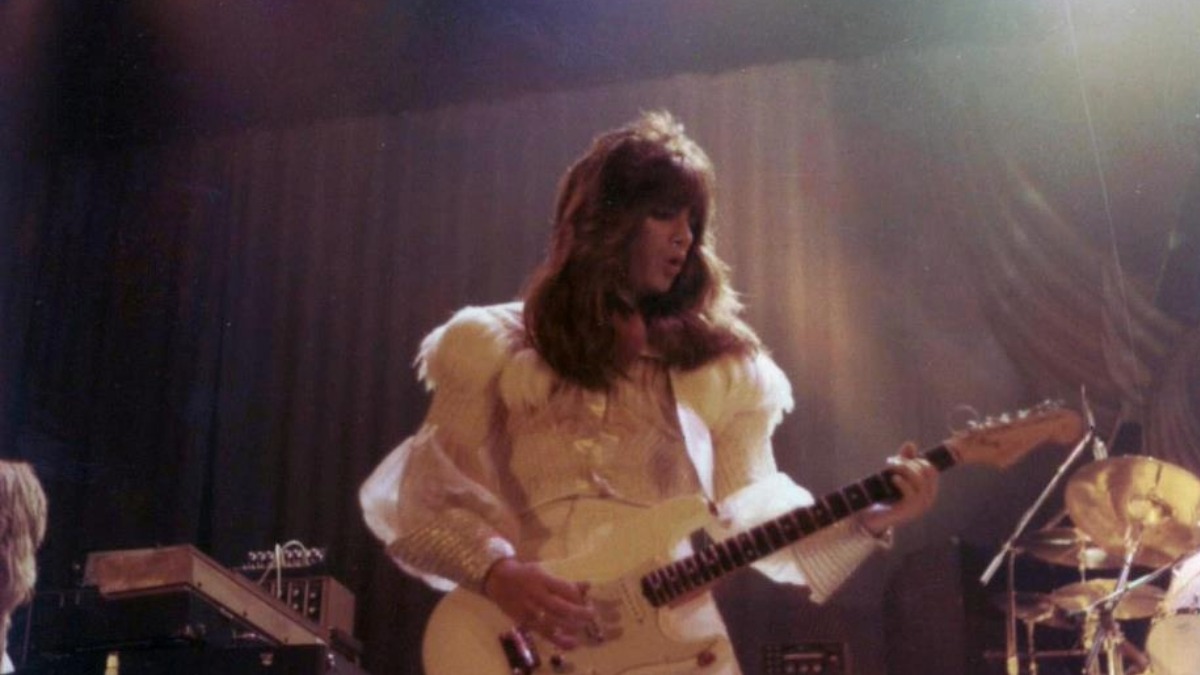Elvis Costello Digs Deep at Carnegie Hall Debut — Review
All the latest guitar news, interviews, lessons, reviews, deals and more, direct to your inbox!
You are now subscribed
Your newsletter sign-up was successful

Elvis Costello made what was billed as his Carnegie Hall debut this week, playing two solo shows that were nothing short of masterclasses in singing and songwriting, with some stellar solo guitar work thrown in for good measure.
Costello, who will celebrate his 60th birthday in August, has enjoyed a storied career by any standard. He's collaborated with Burt Bacharach and, most notably Paul McCartney, on the former Beatle’s best material since working with the original bespectacled Angry Young Man, John Lennon; opened for Bob Dylan numerous times, effortlessly sharing a microphone often with the legend; and his excellent talk show Spectacle a few years back brought discussions about fame, and the art of songwriting and performance, to television in a new and remarkable way, culminating with Costello nearly being brought to tears by Jessie Winchester.
Along the way, Costello has made wildly divergent records, pushing the boundaries of popular music in the process.
But few things could likely be sweeter for Costello in that amazing career than playing for nearly three hours to a packed house at Carnegie Hall, alone with just a guitar (or an electric keyboard), only occasionally playing hits and even then stripping them bare and reworking them in a way that would have made Dylan himself proud.
Costello’s Tuesday-evening show was talked of as his Carnegie Hall debut in that austere tone PR people love to use for such occasions, but the singer joked that it was, in fact, a lie: He’d guested with Spinal Tap when the band played there in 2001.
Similarly, Costello was loose and engaging throughout the long set, which he dubbed alternately an evening of songs about “love and deceit” and “tragedy and exile,” telling finely detailed and witty stories about his childhood and family that had the audience on pins and needles and gave an insight into Costello’s choice of songs and perhaps even his reason for appearing without his band, the Imposters, or longtime cohort Steve Nieve.
Without a band to fall back on, Costello went wherever his muse took him. Nods to the Beatles, Al Green and Dylan were woven into Costello’s own re-imagined originals.
All the latest guitar news, interviews, lessons, reviews, deals and more, direct to your inbox!
“Everyday I Write the Book” was delivered in an arrangement diehard fans would recognize from his performances with Nieve, but without Nieve's accompaniment it was even further from the pop confection of the original record. As he has mentioned before, Costello joked that it’s a song he hates but was enough of a hit that he’s been obliged to play it since. “Alison,” “Watching the Detectives,” — complete with rabid soloing over looping guitar delay — and “Veronica” also were featured, as were a clutch of songs from his spectacular Imperial Bedroom album. “Town Cryer,”“Beyond Belief” and “Man Out of Time” were all stunning. “Shabby Doll” was another highlight, a far cry from its original incarnation but stunning and beautiful nonetheless.
Costello used five Gibson acoustic and electric guitars, relying most heavily on his battered old J-160E, which has the original P100 pickup run through an amp for a deep, guttural gain, and a bridge pickup for a clean, acoustic tone, simultaneously. He also brought out his trusty Fender Jazzmaster a few times, most notably on a searing and stunning “I Want You.” Costello isn’t a masterful player — he once dubbed himself “little hands of concrete” — nor did the cavernous acoustics of the Hall do his melodies any favors at times, but his passion in delivery and the breadth of his catalog more than made up for that.
“Shipbuilding” and “Almost Blue," performed on electric piano, were also highlights, as it was when Costello went off mic and sang unadorned.
But the evening wasn’t really about the hits. The set also included “Come the Meantimes,” “Either Side of the Same Town,” “Church Underground,” “Last Boat Leaving,” “Jimmie Standing in the Rain” and “The Last Year of My Youth,” which Costello said he’d written and performed in one day when Late Night with David Letterman called up desperate for a last-minute replacement for Carly Rae Jepson, though in completely reworked form.
And “Poison Moon” — a demo included on recent deluxe versions of Costello’s debut, My Aim Is True — was introduced as the first song of his he’d heard played on the radio, while sitting at his kitchen table looking out at a streetlamp. It was a shocking experience, he recounted, and he felt like he could hear the sound of a million radios being turned off. But the song was, in fact, a harbinger of things to come, and, with Costello’s introduction in mind, you could easily pick out nearly a dozen snippets of melody or lyrics used in later classics.
“Less Than Zero” was a sprightly surprise and “(What’s So Funny About) Peace, Love and Understanding” closed things out to one of several long and loud standing ovations. But the night was really about a twisting, strange and intelligent trip through Costello’s catalog, curated by the composer himself, with equal weight given to his recent work as to his early, halcyon days, and a keen touch toward challenging his audience in a setting befitting a serious and remarkable artist.
Jeff Slate is a NYC-based solo singer-songwriter and music journalist. He founded and fronted the band the Badge for 15 years beginning in 1997 and has worked with Pete Townshend, Earl Slick, Carlos Alomar, Steve Holley, Laurence Juber and countless others. He has interviewed and written about everyone from the Beatles and Kiss to Monty Python and rock musicals on Broadway. He is an avid collector of rock and roll books and bootlegs and has an encyclopedic knowledge of all things Dylan and the Beatles. For more information, visit jeffslate.net.
